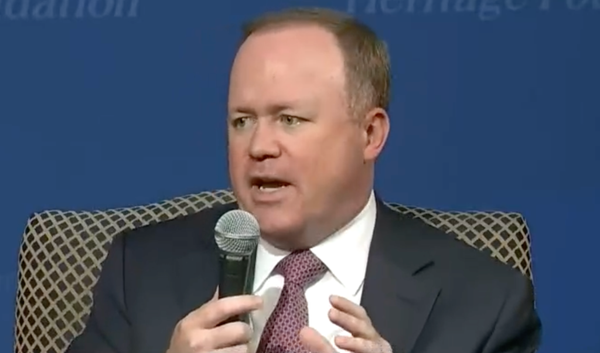Ted Hearn: A Supreme Court Case About Fish Could Harpoon The FCC
Opponents of the Chevron Doctrine aver that judicial deference has gone too far.
Ted Hearn

WASHINGTON, January 15, 2024 – On Wednesday, the Supreme Court will hear a case about federal regulation of the fishing industry.
Anyone who thinks the case is about fish is going to need a bigger boat.
In reality, this whale of a case could harpoon the Federal Communications Commission, which is clearly at risk of seeing its newly approved, highly controversial digital discrimination rules aimed at broadband Internet Service Providers get fed to the sharks.
Since 1984, the Supreme Court’s Chevron Doctrine has required lower courts to defer to an agency like the FCC when reasonably interpreting vague legislative language passed by Congress. The doctrine was established in Chevron U.S.A. v. Natural Resources Defense Council.
Opponents of the Chevron Doctrine aver that judicial deference has gone too far, leading to outsized accretions of bureaucratic power that threaten the nation’s constitutional order sustained by the separation of powers.
“Chevron deference has become a central pillar of the modern administrative state,” said Stanford Law School Professor Michael W. McConnell. “Although Chevron appeared routine when it came out, it has become the most important doctrine in administrative law.”
The FCC under Democratic Chair Jessica Rosenworcel has a lot riding on the high court’s ruling in Loper Bright Enterprises v. Raimondo, which is ostensibly about the regulation of fisheries under the Magnuson-Stevens Act of 1976. A decision is not expected for several months after Wednesday’s oral arguments.
In November, the FCC adopted Internet digital discrimination rules as required by Congress in section 60506 of the Infrastructure Investment and Jobs Act of 2021.
The FCC rules included a “disparate impact” standard imported from civil rights law that can hold ISPs liable for unintentional acts of discrimination across a broad range of activities – from the price and quality of Internet service to late fees, equipment rentals, and the use of customer credit and account history.
Litigation on the basis that the FCC developed rules far broader than Congress intended is inevitable.
“The FCC’s regulatory overreach will prove impossible to administer and impossible to comply with,” said Michael Powell, President & CEO of the NCTA – The Internet & Television Association, in a Nov. 15, 2023 statement.
The Supreme Court likely has at least five justices who want to dismantle the Chevron Doctrine entirely. The Court majority that would do so is likely the same one that in 2022 barred an agency like the FCC from adopting rules of vast economic and political significance without explicit authority from Congress.
The Chevron Doctrine has its defenders, including the Environmental Defense Fund and other green groups that say opponents of judicial deference have been exaggerating the harms.
“This campaign is marked by the kind of sloganeering, argument by anecdote, and sacrifice of empirical rigor that are all too familiar in hardball politics but out of place in legal argumentation,” the EDF said in its amicus brief filed with the Supreme Court last September. “Like any shrewd campaigners, petitioners and their supporters seek to ‘drive up the negatives’ by misstating what Chevron instructs.”
Last June, an article on the Natural Resources Defense Council’s website disputed ideas that the Chevron Doctrine gave an agency like the FCC “a rubber stamp” to adopt onerous rule and regulations. Ironically, the NRDC supports the maintenance of the Chevron Doctrine, even though it was the losing party in the 1984 case.
“…As noted by the Brennan Center for Justice, a nonpartisan law and policy institute, federal agencies face legal challenges to their rules all the time – and only prevail in about 70% these challenges, even with the Chevron Doctrine on their side. In other words, their powers are far from unchecked,” the article said.
A problem with the NRDC article’s analysis is that it gave equal weight to each case in the sample. Broadband ISPs have much more at stake in their likely legal challenge to the FCC’s digital discrimination rules than in their potential case taking on new FCC rules requiring Internet providers to display ‘Broadband Nutrition Labels’ at the point of sale.
In the end, by scuttling the Chevron Doctrine, the Supreme Court will not only reel in a big fish like the administrative state, it will also send Congress a message about the need to craft clear laws.
“Congress will face more pressure to clearly articulate agency authority and delegate fewer details to administrative agencies,” the Brownstein Hyatt law firm said in a client alert last May.
Ted Hearn is the Editor of Policyband, a new website dedicated to comprehensive coverage of the broadband communications market. This piece is was published on Policyband on January 15, 2024, and is reprinted with permission.
Broadband Breakfast accepts commentary from informed observers of the broadband scene. Please send pieces to commentary@breakfast.media. The views expressed in Expert Opinion pieces do not necessarily reflect the views of Broadband Breakfast and Breakfast Media LLC.









Member discussion